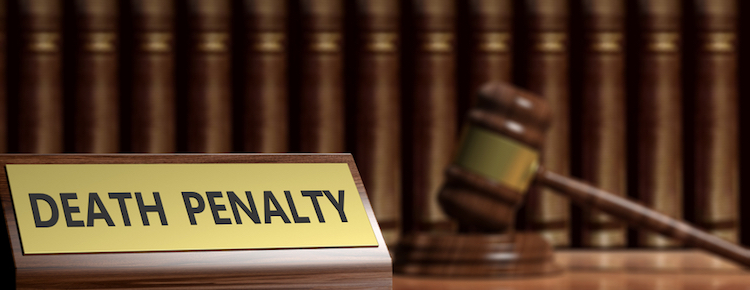Texas death row inmate should get new trial because of judge's anti-Semitic views, new judge says

Image from Shutterstock.
A Dallas judge is recommending a new trial for a Jewish death row inmate after finding the judge who presided over his trial used offensive terms to describe Jewish people and the inmate in particular.
Judge Lela Mays recommended that the Texas Court of Criminal Appeals toss the conviction of Randy Halprin, who was sentenced to death for the murder of a police officer during a robbery after he and six other men broke out of a Texas prison. NBC News and the Washington Post have coverage.
Halprin said he wasn’t the triggerman, but he was found criminally responsible under Texas’ law of parties, which holds conspirators liable for the actions of other conspirators.
The Texas Court of Criminal Appeals had stayed Halprin’s execution in October 2019 and ordered Mays to make findings and recommendations regarding Halprin’s claim of judicial bias.
In her Oct. 11 findings, Mays said Halprin’s trial judge, Vickers “Vic” Cunningham, harbored a bias against Halprin because he is Jewish, violating his due-process right to a fair trial, his First Amendment right to the free exercise of religion, and his 14th Amendment right to equal protection.
Mays found that “inbred bias was thoroughly situated into the conscious mind of Judge Cunningham and it is too much to ignore.”
Mays said Halprin’s Jewish identity was a recurring subject during trial. Halprin had testified he was “picked on” in prison for being Jewish. In the punishment phase, the defense argued that his life was shaped by his search for a Jewish identity and a desire to please his Jewish father. Prosecutors, on the other hand, presented information that Halprin “hated Christians with a passion” after he was shipped off to a Christian boarding school in middle school.
Prosecutors had accepted Halprin’s allegations as true but argued there was no due process violation. Cunningham had himself denied racism allegations when confronted by the Dallas Morning News and said he was always fair on the bench.
Among the allegations:
• Cunningham acknowledged in a videotaped interview that he set up a trust that withheld distributions to any of his children if they married a person who is not white or not Christian.
• A woman who grew up with Cunningham said he didn’t like anyone not of his race, religion or creed. He would use the N word to belittle his brother, and would use other offensive terms to describe minorities. When talking about Jewish people he would use the words “f—in’ Jew” or a “goddamn k-k-.” When he talked about the “Texas Seven” cases, he would often make hateful comments and mention the defendants’ race, ethnicity or religion. He also used offensive terms when talking about Halprin.
• A friend who worked on Cunningham’s unsuccessful campaign for Dallas County district attorney said he used disparaging words to refer to minorities. She also said Cunningham said he was running so we didn’t have to worry about minorities, saying at one point that his job “is to prevent n—— from running wild again.” The friend also heard Cunningham describe the Texas Seven case using racial and religious epithets. He also confided that he believed God has chosen him to preside in the Texas Seven cases.
• Cunningham instructed his daughter to break up with “that Jew boy” she was dating in college. He said some Jewish people were good attorneys, but Jewish people in general needed to be shut down because they controlled all the money and power. He also called renowned defense lawyer Barry Scheck a “filthy Jew” who was going to free “all these n—–.”
• When Cunningham ran for county commissioner he reminded the public that he had presided over Texas Seven death penalty trials and bragged that he “has put more criminals on death row than almost any judge in the nation.”
• Cunningham’s brother reported that Cunningham refused to allow the brother’s husband, a Black man, to enter his home.
According to the Washington Post, one member of the Texas Seven killed himself and four others have been executed. Only Halprin, 44, and Patrick Murphy, 60, remain.
The U.S. Supreme Court blocked Murphy’s execution in March 2019 after he alleged he wasn’t allowed to bring his Buddhist spiritual adviser into the execution chamber. Texas changed its policy, but federal courts have continued to stay the execution amid concerns it didn’t go far enough, the Texas Tribune reported.



